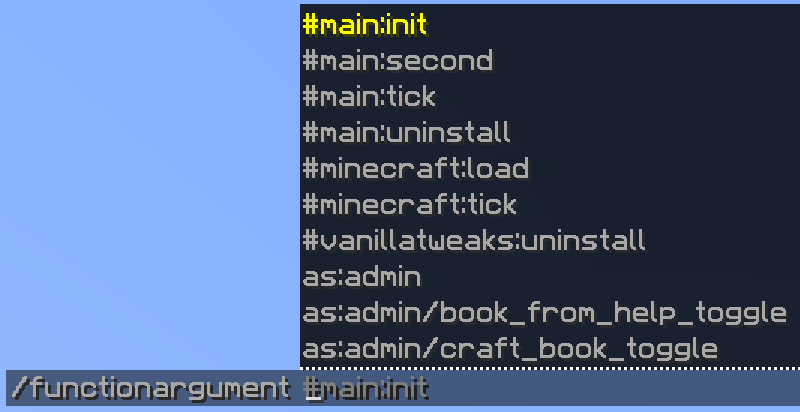Function arguments

The FunctionArgument class is used to represent a function or a tag in Minecraft. When retrieving an instance of the argument, it will return a FunctionWrapper[], where each FunctionWrapper consists of a Minecraft function.
Therefore, if a user supplies a single function, the FunctionWrapper[] will be of size 1, and if the user supplies a tag which can consist of multiple functions, the FunctionWrapper[] will consist of the array of functions as declared by that tag.
Example - Minecraft's /function command
Since it's a little difficult to demonstrate a custom use for the FunctionArgument, we will show how you can implement Vanilla Minecraft's /function command. In this example, we want a command that uses the following syntax:
/runfunction <function>
When provided with a function, it will execute that function. If instead a tag is provided, it will execute that tag (i.e. execute all functions declared in that tag).
new CommandAPICommand("runfunction")
.withArguments(new FunctionArgument("function"))
.executes((sender, args) -> {
FunctionWrapper[] functions = (FunctionWrapper[]) args.get("function");
// Run all functions in our FunctionWrapper[]
for (FunctionWrapper function : functions) {
function.run();
}
})
.register();
CommandAPICommand("runfunction")
.withArguments(FunctionArgument("function"))
.executes(CommandExecutor { _, args ->
val functions = args["function"] as Array<FunctionWrapper>
// Run all functions in our FunctionWrapper[]
for (function in functions) {
function.run()
}
})
.register()
commandAPICommand("runfunction") {
functionArgument("function")
anyExecutor { _, args ->
val functions = args["function"] as Array<FunctionWrapper>
// Run all functions in our FunctionWrapper[]
for (function in functions) {
function.run()
}
}
}